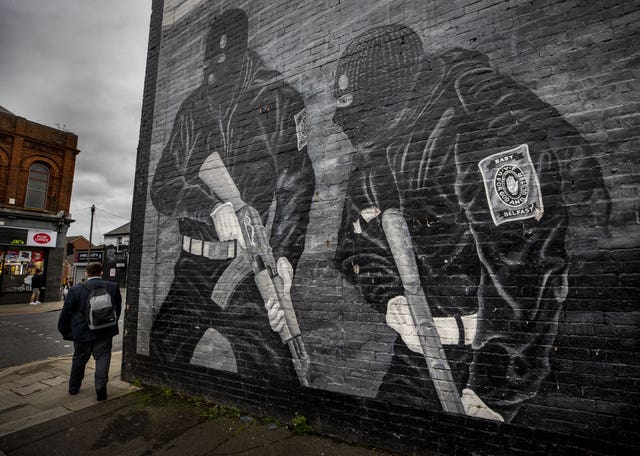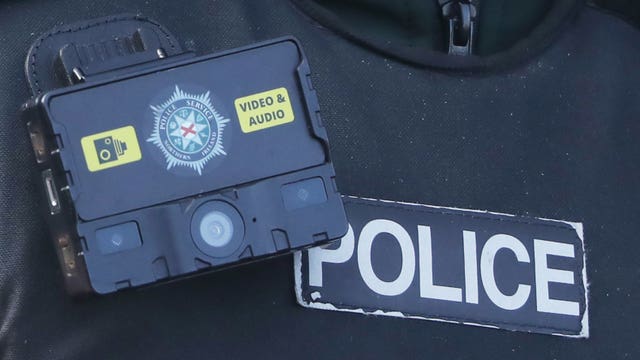Report calls for focus on law enforcement and tackling roots of paramilitarism
The Independent Reporting Commission also urged police to ‘call out’ paramilitary involvement in crime when it happens.

A “twin track” process of law enforcement and tackling the roots of paramilitarism is needed in Northern Ireland, as well as a “group transition” process for them to leave the stage, a report has said.
The Independent Reporting Commission (IRC) has reiterated its call to the UK and Irish governments to appoint an independent person to scope out what a formal process of engagement and group transition might look like.
It has also called on police in Northern Ireland to “call out” when there is paramilitary group involvement in crime.
The calls come in the IRC’s seventh report following what it has termed a “mixed year” in the region, with a decease in shootings and paramilitary-style assaults, but “concerning levels of intimidation, coercive control and threats”.

The body – led by commissioners John McBurney, Monica McWilliams, Tim O’Connor and Mitchell Reiss – was established in 2017 to report annually on progress towards ending paramilitary activity in the region.
It is governed by an international treaty between the UK and Irish governments which reflected the terms of the Fresh Start Agreement concluded by the two governments and the Northern Ireland parties in 2015.
In a statement following the seventh report, the commissioners described “shifting dynamics” within both republican and loyalist paramilitary groups.
They said: “There has been a decrease in shooting incidents and paramilitary-style assaults. However, bombing incidents and casualties from paramilitary-style shootings have remained consistent with previous years.
“Intimidation, coercive control and threats linked to paramilitary groups persist and remain a real concern.
“In 2024, we have seen shifting dynamics within both republican and loyalist paramilitary groups, including changes in leadership, reported splits, speculation about possible feuds, ongoing questions about whether actions were sanctioned by paramilitary leaders, various interpretations of larger gatherings of people and increasing interactions with organised crime.
“We understand that this can be challenging for the PSNI and others in attributing responsibility for, or involvement in, certain actions. However, where there is paramilitary involvement, this must be called out and the harm it causes has to be named.”
The commissioners have also emphasised the need for a “twin track” approach of tackling paramilitarism as well as a formal process of group transition.
They said: “Track one comprises a robust and targeted set of law enforcement measures addressing paramilitarism, coupled with an effective wider criminal justice response.
“Track two involves a comprehensive tackling of the deep-rooted socio-economic conditions which are linked to the continuing existence of paramilitarism today.
“Both tracks, which are inter-related, are vital in the task of tackling and ending paramilitarism.
“Our report advocates for a third dimension to complement the twin-track approach: an agreed formal process of group transition, involving direct engagement with the paramilitary groups themselves, in order to bring about their ending.”
The commissioners have called for the UK and Irish governments to appoint an independent person to “prepare the ground” for a group transition process.

“We welcome the progress being made by the two governments towards implementing our recommendation to appoint an independent person who would scope out what a possible formal process of engagement and group transition might look like,” they said.
The commissioners also welcomed the focus on paramilitarism in the new draft Programme for Government of the Northern Ireland Executive.
They said: “We strongly recommend that some of the targeted paramilitary-focused work which the programme has been responsible for should continue beyond 2027, while also ensuring that consideration is given to those elements of the work of tackling paramilitarism that could be integrated into mainstream policies.”
The IRC’s report includes three recommendations.
These are a call for the review of the membership of the sponsor group which oversees the Executive Programme on Paramilitarism and Organised Crime and that the Executive ensures a “whole-of-government” approach.
They have also recommended that paramilitary-focused work needs to continue beyond March 2027 when the Executive Programme on Paramilitarism and Organised Crime is due to end.





